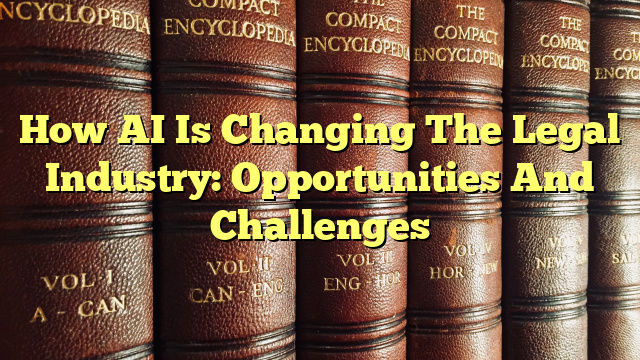The legal industry has been slow to embrace new technology, but that is finally beginning to change. Artificial intelligence is a powerful tool that is revolutionizing the industry, from increasing legal automation, to streamlining and speeding up processes, to improving the accuracy of research, to helping lawyers and paralegals offer better, more personalized advice.
Table of Contents
- Legal Challenges
- Benefits of AI in Legal Industry
- Disadvantages of AI in Legal Industry
- Can AI be Problematic in the Legal Sector?
- Legal AI Startups
Legal Challenges
One of the major legal challenges associated with artificial intelligence is the effect it will have on the role of human lawyers. AI is capable of automating many of the tedious, mundane tasks that lawyers and paralegals currently perform manually, such as document review and research, significantly decreasing the need for human labor. In addition, AI can more accurately identify patterns in large amounts of data, which could lead to the development of legal prediction tools that could replace the need for human attorneys in certain areas of the law. As a result, the legal industry is facing the challenge of adapting to the changing landscape and finding ways to leverage AI to their advantage.
Benefits of AI in Legal Industry
Despite these challenges, AI offers a wide range of opportunities for the legal industry. Most notably, AI can significantly reduce the amount of time it takes for lawyers and paralegals to perform tedious research and review tasks, allowing them to focus their attention on more complex and value-adding tasks. AI can also be used to better understand the legal landscape, and to make more accurate predictions about the outcomes of legal cases. Finally, AI can be used to provide more personalized advice to clients.
Disadvantages of AI in Legal Industry
The primary disadvantage of AI in the legal industry is the potential for bias. AI algorithms are only as good as the data that is fed into them, and if the data is skewed in any way, the results of the algorithms could be biased. Additionally, AI algorithms are only capable of completing tasks that they are programmed to do, and they are not capable of understanding the context of a situation or the nuances of the law. As a result, they are not yet capable of replacing the role of a human lawyer.
Can AI be Problematic in the Legal Sector?
AI can be problematic in the legal sector if it is not used properly. As mentioned above, AI algorithms are only as good as the data that is fed into them, and if the data is biased or incomplete, the results of the algorithms could be biased as well. Additionally, AI algorithms may not be able to understand the nuances of the law, which could lead to inaccurate or incomplete legal advice. It is important for lawyers and paralegals to be aware of these potential pitfalls and to use AI responsibly.
Legal AI Startups
As the legal industry adapts to the changing landscape, a number of legal AI startups have emerged, offering innovative solutions that leverage the power of AI to automate tedious tasks, streamline processes, and provide more accurate and personalized legal advice. These startups include ROSS, a legal research and analysis tool that uses AI to help lawyers find answers to their legal questions faster; Everlaw, a cloud-based e-discovery platform that uses AI to help lawyers find and manage evidence more effectively; and LawGeex, a contract review platform that uses AI to help lawyers review contracts faster and more accurately.
AI is rapidly changing the legal industry, and it is important for lawyers and paralegals to understand the opportunities and challenges presented by this powerful technology. While AI can help to streamline processes and improve the accuracy of research and advice, it is important to be aware of the potential pitfalls and to use it responsibly. With the help of innovative legal AI startups, the legal industry is beginning to embrace the potential of this


Although there are certainly opportunities for AI to revolutionize the legal industry, I fear it brings a set of challenges that are underestimated. With a technology as sophisticated as AI, human oversight is integral to ensure its optimal use in the legal industry.